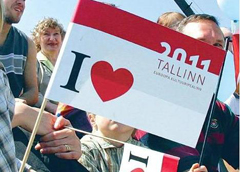Culture, Estonia, EU – Baltic States, Good for Business, Tourism
International Internet Magazine. Baltic States news & analytics
Friday, 16.01.2026, 05:17
Tallinn to unveil its sea treasures as European Capital of Culture 2011
 Print version
Print version |
|---|
Over 250 different events and festivals have been planned for the coming year that center on the motto, "Stories of the Seashore," which hints at Estonian history and reflects Tallinn's location next to the sea, writes LETA.
According to Maris Hellrand, the spokeswoman for the Tallinn 2011 organizational committee, the relationship between Tallinn and the sea is of particular importance.
Until the end of the Soviet Union's reign over Estonia, which ended in 1991, the city's shores were a restricted military zone. The soldiers are no longer there today, but access to the sea is still largely obstructed. This is set to change in 2011.
"At the moment, there's still an old jail at the seashore," said Hellrand. "We want to transform the seaside promenade in front of it into a 'Culture Kilometer.'"
The Culture Kilometer is the planned heart for the year's celebrations, with most of the Tallinn 2011 events taking place there.
Estonia, which is due to join the euro currency zone on January 1, wants to present itself as a modern European country in 2011. This image allows for some breaks with tradition, such as the film project "60 seconds of solitude in the year zero." According to its initiator Indrek Kasela, it is "a declaration of love to the cinema."
"We asked film directors from around the world to produce one-minute clips on the topic of solitude," said Kasela. "They will be put together into a one-hour film."
The film is due to be screened in August – not at a movie theater but on a large screen mounted in the sea. The audience will be able to see it from the shore and watch as it bursts into flames together with the film reel at the end of the screening. As only one copy of the film reel will be produced, the event will be unique in the truest sense of the word.
Another project offers more long-term entertainment. Planned for May, "MIM goes sustainable" is a mixture of performance and theater – but with a twist. It involves audience members producing electricity for the stage lighting by pedaling on indoor bikes. In this way, they help create a stage show that does not depend on fossil fuels.
The creators of Tallinn 2011 hope to combine the future with tradition. The Youth Song and Dance Celebration Festival aims to exemplify that combination and will serve as one of the main Capital of Culture events.
Choral singing is an important tradition in Estonia's history, having played a key role in the Singing Revolution – a series of spontaneous mass-singing demonstrations that took place between 1987 and 1991 to help bring about Estonia's independence from the Soviet Union.
In 2011, thousands are expected to gather at the Tallinn Song Festival Grounds for several days in a special commemoration the 20th anniversary of independence. "This festival is an opportunity to get a glimpse into the Estonian soul within one weekend," said Hellrand. "This is what we are. This is why we are."
Another highlight will be the Tallinn Maritime Days, July 15 to 17, hailed as the largest free family event in Estonia. A new exhibition will open at the Estonian Maritime Museum in the renovated hangars of the former Seaplane Port. Walkers will also be able to enjoy the newly opened seaside promenade.
In late December, a closing ceremony will be held in the center of the city. Combining tradition and modern technology, church tower bells will ring out over the Old Town, playing a tune composed especially for the occasion. They will remind all those who hear them of Tallinn's cultural treasures, while at the same time allowing the city to take a final bow as the European Capital of Culture.








 «The Baltic Course» Is Sold and Stays in Business!
«The Baltic Course» Is Sold and Stays in Business!

